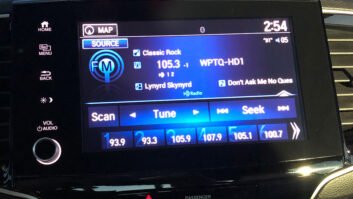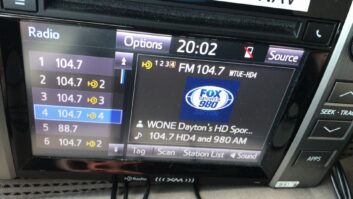I met Tim Westergren a while ago, when we were both keynote speakers at a conference here in the United Kingdom. He’s a nice man: passionate about his product but also down to earth. (He wore a t-shirt. Not many conference speakers wear t-shirts. I think there’s a law against it it.)

James Cridland. Image courtesy BBC Academy
Westergren has a product, Pandora, that’s worth being passionate about. If all you want is music, it’s a great jukebox service. I loved it when it was available in the U.K., and whenever I’m back in the U.S., I sneak a little listen every now and again in hotel rooms wherever I am — that is, if I can’t find something on the radio that I like.
Curated, live, local
Radio, as a brand, stands for a live, local, shared experience curated by human beings. Pandora isn’t radio — it’s a jukebox driven by a computer algorithm.
Listening to Pandora, I stand little chance of knowing when my electricity will be turned back on or when the hurricane will get worse. I don’t know when the subway isn’t working, or who won the big game last night, or exactly what will come out of Limbaugh’s mouth next.
Musically, I don’t hear something that surprises me; I don’t hear a great story behind a song, or any information about the artist that I didn’t already know. I don’t hear exclusive live performances, and I don’t even hear a good segue.
I understand why the company branded itself using “radio.” Radio is a great thing, and Westergren understands that people might use Pandora more readily if “radio” is part of their product.
However, because Pandora has stolen the radio brand, in the mind of many consumers we’re one and the same. Those of us in “real” radio have idly sat by and let others redefine what we are.

An exterior shot of a “real” radio station in the UK, taken by the author.
Pandora hasn’t just stolen a brand; they’ve deliberately confused the marketplace. Pandora CEO Joseph Kennedy claimed recently that Pandora is “one of the largest radio stations in every market in the country” during their last quarterly earnings call. Really?
Let’s put Pandora side by side with a large radio operator like CBS Radio, which, just like Pandora, offers a variety of programming for the audience to the same market. Pandora shrinks in comparison. The only thing in Pandora’s box, so to speak, is a whole lot of confusion.
Westergren can’t reach agreement with the music rights holders in order to get Pandora into the U.K., so what does he do? He goes after the radio industry.
In a recent interview for the website PaidContent, Westergren boasted,“The number of Internet radio hours streamed by all services in the U.K. in a quarter is roughly equal to the number of Internet radio hours streamed by just Pandora on a single day.”
Of course, that statement is flawed, and not just because the U.S. clearly has a larger population than the U.K. (who knew?!). More importantly, Westergren didn’t read the U.K. radio research figures properly, mistaking a week’s Internet streaming figure for an entire quarter.
In fact, if I might fly the flag for British radio, when you compare the figures correctly, U.K. radio performs just as well as Pandora online. We’re doing something right on this small damp island after all.
Star quality
Pandora is not “radio,” no matter how hard the company claims it is. I will never start a conversation with “did you hear Pandora this morning?” I won’t tune in to Pandora in a new city to find out what’s going on. I won’t hear amazing stories on Pandora, nor something that’ll make me smile.
The company clearly wants a bit of radio’s star quality, and that’s to be expected. Ninety-three percent of the U.S. uses radio every week, after all. But to be part of that success, it helps if you don’t try to destroy the very thing you aspire to be.
This is not the way to gain allies, old chap. No matter how many t-shirts you wear in conferences.
Cridland is a radio futurologist and managing director of Media UK, www.mediauk.com.












